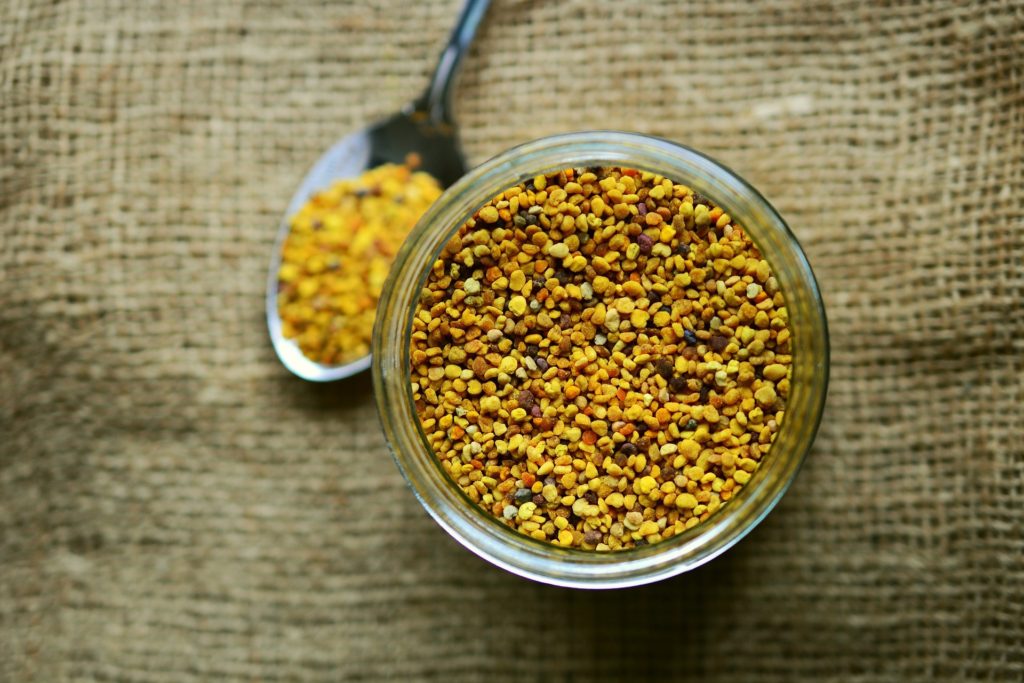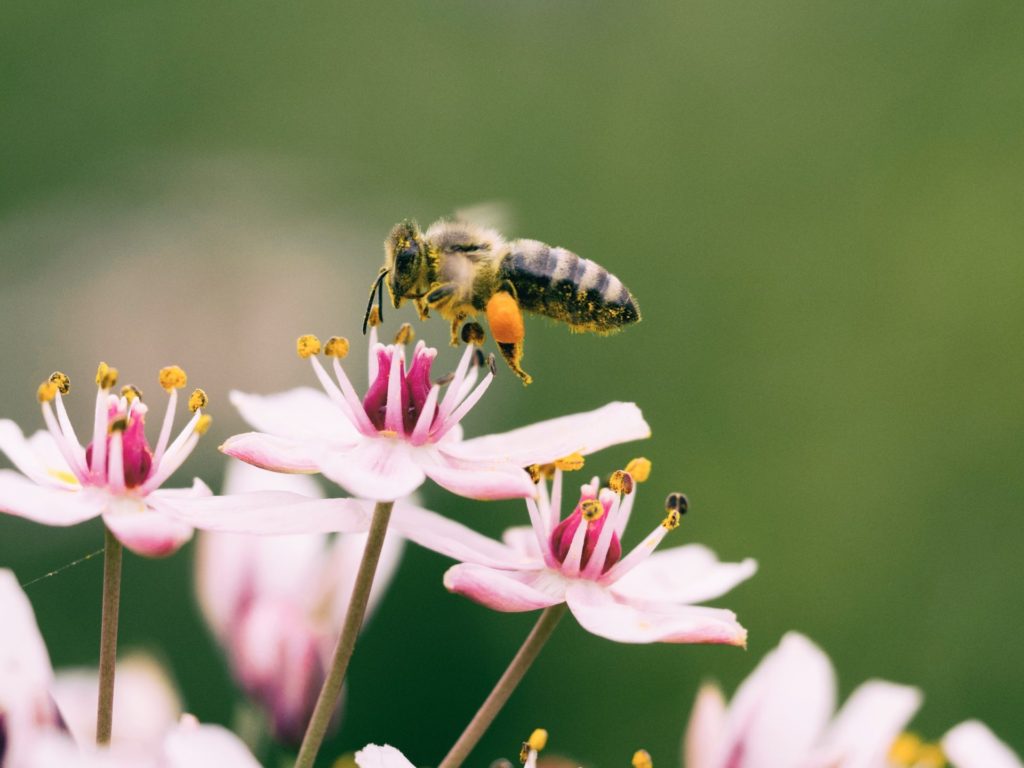5 Health Benefits of Bee Pollen
This is a blog post from My Honey Crate, written by Olivia Li.

Image by congerdesign from Pixabay
Have you ever wondered what those yellow sacks on a bee’s legs are? It’s bee pollen or the miracle dust. When young bees land on a flower, they create balls by collecting flower pollen and mixing it with their saliva, wax, and nectar or honey. Then, they carry that in a sack on their leg back to their hives. Bee colonies feed on “bee bread,” which is fermented bee pollen. To collect bee pollen, beekeepers place a thick comb in front of the hive. The comb brushes off the dust on the bees’ legs, and a bin collects the pollen.
According to the US National Library of Medicine, early humans considered bee pollen the “dust of life.” It was a part of their diet and commonly used as medicine. Now, humans are adding bee pollen into their yogurts, oatmeal, and smoothies for the same benefits our ancestors enjoyed.
Bee pollen’s nutritional content depends on the season it is collected and the type of plant it originates. One tablespoon of bee pollen contains about:
- 16 calories
- 0.24 grams of fat,
- 1.2 grams of protein,
- 2.18 grams of carbohydrates
- 250 active substances, including vitamins, nutrients, amino acids, lipids, minerals, and antioxidants.
1. Antioxidants And Their Health Benefits
Human bodies naturally produce free radicals when turning food into energy, when atoms are oxidized. Free radicals also caused by stress, smoking, alcohol, and environmental factors, such as air pollutants. Dr. Diana Howard from the International Dermal Institution states that free radicals form when an electron’s bond breaks and it is left unpaired. Disaster follows. The unpaired electron is now chemically unstable. Thus, it will try to steal an electron from another atom, and the reaction continues. On a cellular level, these free radicals cause inflammation. According to the National Library of Medicine, inflammation then leads to a heightened risk of chronic diseases like arthritis, type two diabetes, and cancer. Fear not! Bee pollen is bursting with antioxidants. Antioxidants prevent and get rid of free radicals by giving back the lost electron.
- The antioxidants in bee pollen can treat or prevent cancer.
One type of antioxidant, flavonoids found in bee pollen, is known to stop tumor growth. Tumors, or unregulated cell growth, cause cancer. In a series of studies, scientists have determined that another active substance in bee pollen kills prostate cancer cells. Bee pollen is effective against breast cancer too.
- The antioxidants in bee pollen can eliminate harmful bacteria and fight infections.
Scientists from Slovakia found that bee pollen kills dangerous bacteria such as E Colli and Samonella. Because of bee pollen’s antimicrobial properties, it is useful for fighting infections and treating burns on animals (so far). The treatment allowed new tissue to be formed without disease when the experimenter applied a bee pollen ointment to the injuries of two pigs.
- The antioxidants in bee pollen are excellent in treating autoimmune ailments such as allergies and chronic inflammation.
The symptoms of chronic inflammation include body pain, insomnia, depression, anxiety, and a whole slew of other problems. Inflammation also causes autoimmune disorders. Autoimmune disorders happen when the body’s immune system attacks itself, and some examples are swelling, allergies, and eczema. According to Healthline.com, plant compounds in bee pollen may suppress the hormones responsible for inflammation. Another study shows that applying bee pollen to inflamed rats’ paws reduced the swelling by 75%. Antioxidants are pretty amazing, aren’t they? But wait, there’s more!
2. Lowers The Risk of Heart Disease
Yup. We’ve all heard of it. Heart disease. The number one cause of death in the world. Oxidized lipids clumping together cause clogged arteries. High levels of LDL or “bad cholesterol” (not the cholesterol from eggs) are also risk factors of heart disease. The antioxidants in bee pollen prevent lipids from oxidizing and other components of bee pollen may lower LDL.
Here’s another interesting fact. Bee pollen may improve nearsightedness caused by clogged arteries. Is there anything bee pollen can’t do?
3. Benefits The Liver
The liver is one busy, vital organ. It processes fats and proteins into energy that can be used later and keeps the body free from toxins by breaking them down or flushing them out. In a series of studies done on elderly animals, bee pollen boosted the liver’s waste removal ability. Bee pollen has also protected animal livers from damage and helped the liver heal itself. There haven’t been any experiments done on human organs. Still, the results of these test cases could pave the way for more scientific breakthroughs.
4. Soothes Menopause Symptoms
Hot flushes. Mood swings. Insomnia. Fatigue. No, these aren’t symptoms of a deadly new virus but symptoms of a condition that many women face. There’s something that can help, though. In 2005, a study on 64 patients with menopause found that 65% of the patients who took bee pollen reported that they felt their symptoms alleviate. A similar experiment on 46 patients with menopause in 2015 had patients take bee pollen and honey. 71% of the patients who received bee pollen reported that their symptoms significantly improved.
5. Increases Longevity and May Improve Nutrient Absorption
The vitamin C and bioflavonoids in bee pollen helped iron-deficient rats absorb 66% more iron. Healthy rats acquired more calcium and phosphorus due to the proteins and amino acids in bee pollen. Sadly, no studies have been done on humans yet.
By decreasing the risks of chronic diseases, bee pollen does lengthen lives. It also maximizes the quality of life by reducing inflammation and generally promoting health.

Ok, I don’t know about you, but the power of bee pollen blows my mind. Surely something this amazing is as this would cost an arm and a leg. Nope! It’s very accessible and reasonably priced. You can find it online or at your local beekeeper’s shop. Only one piece of warning, if you’re allergic to bees or pollen, or if you’re are pregnant, don’t use bee pollen. Other than that, nothing is stopping you from reaching your peak health with bee pollen. Bon voyage!
Want to try bee pollen? Check out our Bee Pollen, responsibly harvested from hives here in the USA.
WARNING: If you have sensitivities to pollen or do not know how you react to pollen, please speak with your doctor before consuming.
